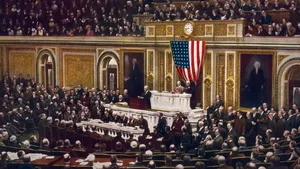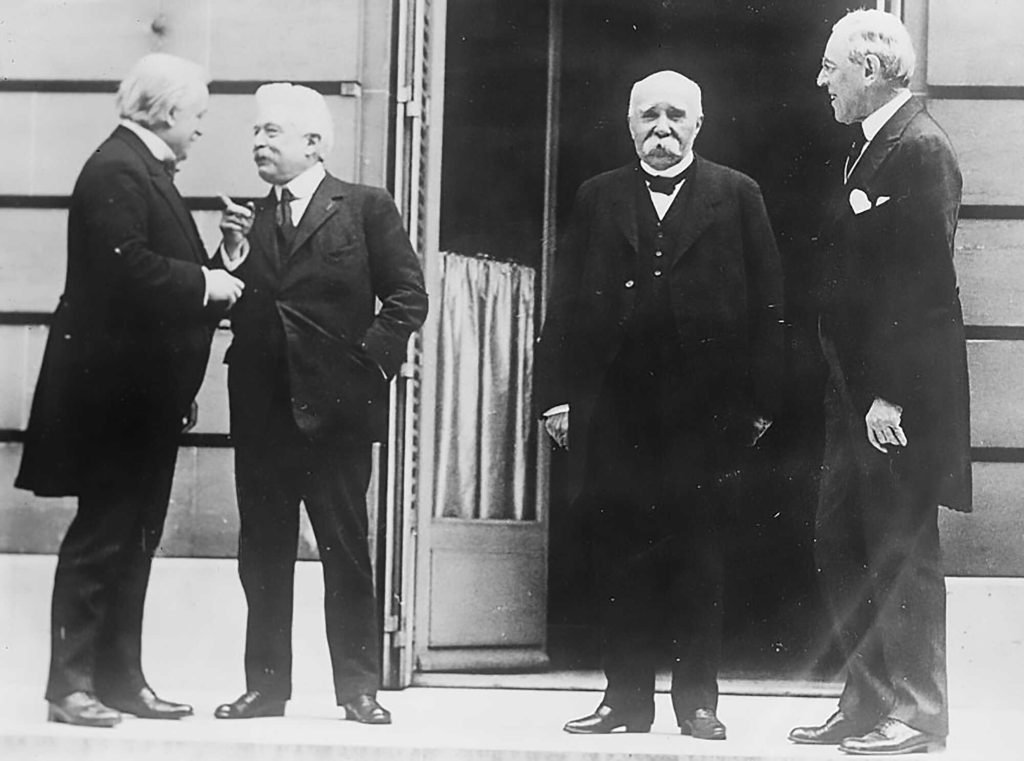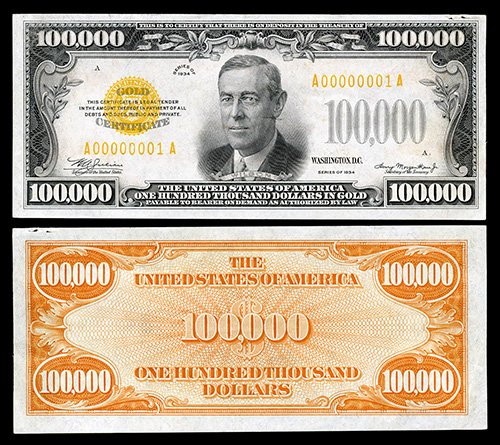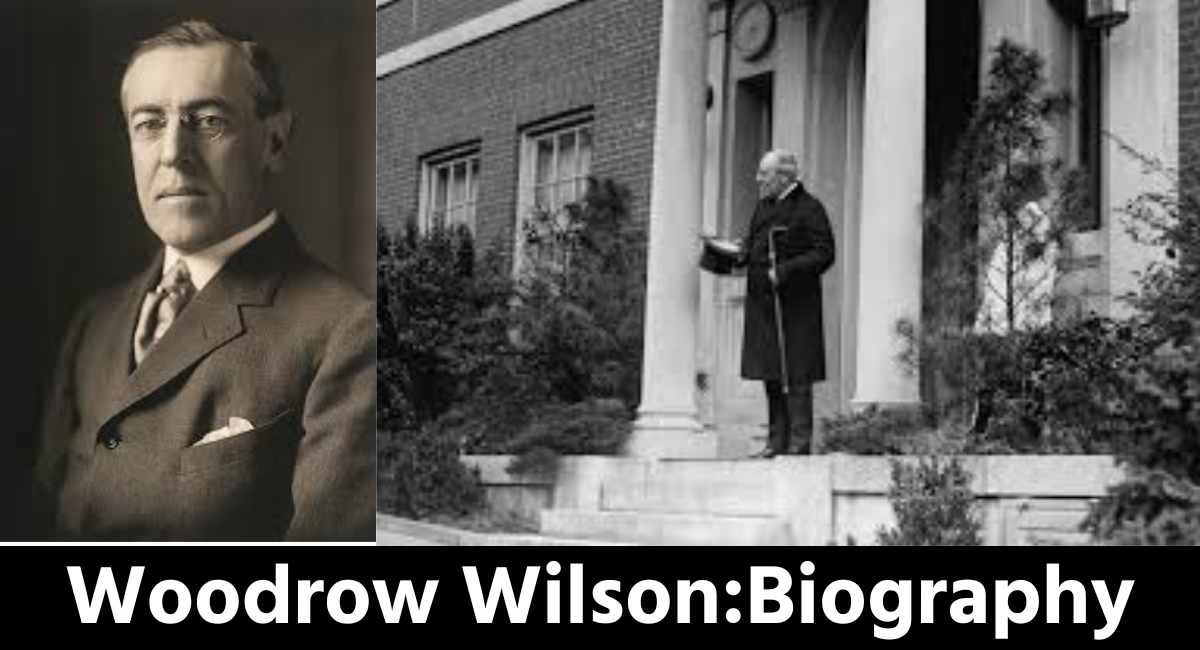Thomas Woodrow Wilson (December 28, 1856 – February 3, 1924) was an American politician and academic who served as the 28th president of the United States from 1913 to 1921. A member of the Democratic Party, Wilson served as the president of Princeton University and as the governor of New Jersey before winning the 1912 presidential election. As president, Wilson changed the nation’s economic policies and led the United States into World War I in 1917. He was the leading architect of the League of Nations, and his progressive stance on foreign policy came to be known as Wilsonianism.
Woodrow Wilson
Wilson Born in Staunton, Virginia, Wilson grew up in the Southern United States, mainly in Augusta, Georgia, during the American Civil War and Reconstruction era. After earning a Doctor of Philosophy (Ph.D.) in history and political science from Johns Hopkins University, Wilson taught at various colleges before becoming the president of Princeton University and a spokesman for progressivism in higher education. As governor of New Jersey from 1911 to 1913, Wilson broke with party bosses and won the passage of several progressive reforms.
To win the presidential nomination he mobilized progressives and Southerners to his cause at the 1912 Democratic National Convention. Wilson defeated incumbent Republican William Howard Taft and third-party nominee Theodore Roosevelt to easily win the 1912 United States presidential election, becoming the first Southerner to do so Wilson since 1848.
During his first year as president, Wilson authorized the widespread imposition of segregation inside the federal bureaucracy. He ousted many African Americans from federal posts and his opposition to women’s suffrage drew protests. His first term was largely devoted to pursuing passage of his progressive New Freedom domestic agenda. His first major priority was the Revenue Act of 1913,
Wilson:Facts
- Born : Thomas Woodrow Wilson December 28, 1856 Staunton, Virginia, U.S.
- Died : February 3, 1924 (aged 67) Washington, D.C., U.S.
- Resting place : Washington National Cathedral
- Political party : Democratic
- Spouses: Ellen Axson, (m. 1885; died 1914), Edith Bolling, (m. 1915)
- Children: Margaret, Jessie, Eleanor
- Parents: Joseph Ruggles WilsonJessie Janet Woodrow
- Occupation: Academic politician
- Awards: Nobel Peace Prize (1919)
Wilson:Early life and education
Thomas Woodrow Wilson was born to a family of Scots-Irish and Scottish descent in Staunton, Virginia. He was the third of four children and the first son of Joseph Ruggles Wilson and Jessie Janet Woodrow. Wilson’s paternal grandparents had immigrated to the United States from Strabane, County Tyrone, Ireland, in 1807, and settled in Steubenville, Ohio. Wilson’s paternal grandfather James Wilson published a pro-tariff and anti-slavery newspaper, The Western Herald and Gazette.
Wilson’s maternal grandfather, Reverend Thomas Woodrow, moved from Paisley, Renfrewshire, Scotland, to Carlisle, Cumbria, England, before migrating to Chillicothe, Ohio, in the late 1830s. Joseph met Jessie while she was attending a girl’s academy in Steubenville, and the two married on June 7, 1849. Soon after the wedding, Joseph was ordained as a Presbyterian pastor and assigned to serve in Staunton.His son Woodrow was born in the Manse, a house in the Staunton First Presbyterian Church where Joseph served. Before he was two years old, the family moved to Augusta, Georgia

Wilson’s earliest memory of his early youth was of playing in his yard and standing near the front gate of the Augusta parsonage at the age of three, when he heard a passerby announce in disgust that Abraham Lincoln had been elected and that a war was coming. Wilson was one of only two U.S. presidents to be a citizen of the Confederate States of America; the other was John Tyler, who served as the nation’s tenth president from 1841 to 1845. Wilson’s father identified with the Southern United States and was a staunch supporter of the Confederacy Wilson Wilson during the American Civil War.
Wilson’s father was one of the founders of the Southern Presbyterian Church in the United States (PCUS) following its 1861 split from the Northern Presbyterians. He became minister of the First Presbyterian Church in Augusta, and the family lived there until 1870. From 1870 to 1874, Wilson lived in Columbia, South Carolina, where his father was a theology professor at the Columbia Theological Seminary.In 1873, Wilson became a communicant member of the Columbia First Presbyterian Church; he remained a member throughout his life.

Wilson attended Davidson College in Davidson, North Carolina in the 1873–74 school year but transferred as a freshman to the College of New Jersey, which is now Princeton University,where he studied political philosophy and history, joined the Phi Kappa Psi fraternity, and was active in the Whig literary and debating society.He was also elected secretary of the school’s football association, president of the school’s baseball association, and managing editor of the student newspaper In the hotly contested presidential election of 1876, Wilson supported the Democratic Party and its nominee, Samuel J. Tilden.
Thomas Woodrow Wilson (December 28, 1856 – February 3, 1924) was an American politician and academic who served as the 28th president of the United States from 1913 to 1921. A member of the Democratic Party, Wilson served as the president of Wilson Princeton University and as the governor of New Jersey before winning the 1912 presidential election. As president, Wilson changed the nation’s economic policies and led the United States into World War I in 1917. He was the leading architect of the League of Nations, and his progressive stance on foreign policy came to be known as Wilsonianism.
After graduating from Princeton in 1879, Wilson attended the University of Virginia School of Law in Charlottesville, Virginia, where he was involved in the Virginia Wilson Glee Club and served as president of the Jefferson Literary and Debating Society.[ Poor health forced Wilson to withdraw from law school, but he continued to study law on his own while living with his parents in Wilmington, North Carolina Wilson was admitted to the Georgia bar and made a brief attempt at establishing a law firm in Atlanta in 1882 hough he found legal history and substantive jurisprudence interesting, he abhorred the day-to-day procedural aspects of the practice of law. After less than a year, Wilson abandoned his legal practice to pursue the study of political science and history.
In late 1883, Wilson enrolled at the recently established Johns Hopkins University in Baltimore for doctoral studies.] Built on the Humboldtian model of higher education, Johns Hopkins was inspired particularly from historic Heidelberg University in Germany and was committed to research as central to its academic and institutional mission. Wilson studied history, political science, German, and other fields. Wilson hoped to become a professor, writing that “a professorship was the only feasible place for me, the only place that would afford leisure for reading and for original work, Wilson the only strictly literary berth with an income attached.”

Wilson spent much of his time at Johns Hopkins University writing Congressional Government: A Study in American Politics, which grew out of a series of essays in which he examined the workings of the federal governmentIn 1886, Wilson was awarded a Ph.D. in history and government from Johns Hopkins University, making him the only U.S. president in the nation’s history to possess aWilson Ph.D. In early 1885, Houghton Mifflin published Wilson’s Congressional Government, which was well received with one critic called it “the best critical writing on the American constitution which has appeared since the ‘Federalist’ papers
Wilson:Marriage and family
Wilson Thomas Woodrow Wilson (December 28, 1856 – February 3, 1924) was an American politician and academic who served as the 28th president of the United States from 1913 to 1921. A member of the Democratic Party, Wilson served as the president of Princeton University and as the governor of New Jersey before winning the 1912 presidential election. As president, Wilson changed the nation’s economic policies and led the United States into World War I in 1917. He was the leading architect of the League of Nations, and his progressive stance on foreign policy came to be known as Wilsonianism.
In 1883, Wilson met and fell in love with Ellen Louise Axson. He proposedWilson marriage in September 1883; she accepted, but they agreed to postpone marriage while Wilson attended graduate school. Axson graduated from Art Students League of New York, worked in portraiture, and received a medal for one of her works from the Exposition Universelle (1878) in Paris. She agreed to sacrifice further independent artistic pursuits in order to marry Wilson in 1885. Ellen learned German so she could help translate German-language political science publications relevant to Woodrow’s research.
Wilson In April 1886, the couple’s first child, Margaret, was born. Their second child, Jessie, was born in August 1887.Their third and final child, Eleanor, was born in October 1889. In 1913, Jessie married Francis Bowes Sayre Sr., who later served as High Commissioner to the Philippines. In 1914, their third child Eleanor married William Gibbs McAdoo, U.S. Secretary of the Treasury under Woodrow Wilson and later a U.S. Senator from California.
Academic career
rom 1885 to 1888, Wilson taught at Bryn Mawr College, a newly Wilson established women’s college in Bryn Mawr, Pennsylvania, outside Philadelphia.Wilson taught ancient Greek and Roman history, American history, political science, and other subjects. At the time, there were only 42 students at the college, nearly all of them too passive for his taste. M. Carey Thomas,Wilson the dean, was an aggressive feminist, and Wilson clashed with her over his contract, resulting in a bitter dispute. In 1888, Wilson left Bryn Mawr College and was not given a farewell.
Wilson accepted a position at Wesleyan University, an elite undergraduate college for men in Middletown, Connecticut. He taught graduate courses in political economy and Western history, coached Wesleyan’s football team, and founded a debate team.

In February 1890, with the help of friends, Wilson was appointed Chair of JurisprudenceWilson and Political Economy at the College of New Jersey (the name at the time of Princeton University), Wilson at an annual salary of $3,000 (equivalent to $97,711 in 2022). Wilson quickly earned a reputation at Princeton as a compelling speaker.1896, Francis Landey Patton announced that College of New Jersey was being renamed Princeton University; an ambitious program of expansion for the university accompanied the name change.]In the 1896 presidential election, Wilson rejected Democratic nominee William Jennings Bryan as too far to the left and instead supported the conservative “Gold Democrat” nominee, John M. Palmer. Wilson’s academic reputation continued to grow throughout the 1890s, and he turned down multiple positions elsewhere, including at Johns Hopkins University and the University of Virginia.
William Henry Harrison:Biography
Wilson At Princeton University, Wilson published several works of history and political science and was a regular contributor to Political Science Quarterly. Wilson’s textbook, The State, was widely used in American college courses until the 1920sIn The State, Wilson wrote that governments could legitimately promote the general welfare “by forbidding child labor, by supervising the sanitary conditions of factories, by limiting the employment of women in occupations hurtful to Wilson their health, by instituting official tests of the purity or the quality of goods sold, by limiting the hours of labor in certain trades, [and] by a Wilson hundred and one limitations of the power of unscrupulous or heartless men to out-do the scrupulous and merciful in trade or industry.” He also wrote that charity efforts should be removed from the private domain and “made the imperative legal duty of the whole,” a position which, according to historian Robert M. Saunders, seemed toWilson indicate that Wilson “was laying the groundwork for the modern welfare state.”His third book, Wilson Division and Reunion
Wilson:President of Princeton University
Wilson In June 1902, Princeton trustees promoted Professor Wilson to president, replacing Patton, whom the trustees perceived to be an inefficient administrator. Wilson aspired, as he told alumni, “to transform thoughtless boys performing tasks into thinking men.” He tried to raise admission standards and to replace the “gentleman’s C” with serious study. To emphasize the development of expertise, Wilson instituted academic departments and a system of core requirements. StudentsWilson were to meet in groups of six under the guidance of teaching assistants known as preceptors.To fund these new programs, Wilson undertook an ambitious and successful fundraising campaign, convincing alumni such as Moses Taylor Pyne and philanthropists such as Andrew Carnegie to donate to the school.

Wilson appointed the first Jew and the first Roman Catholic to the faculty, and helped liberate the board from domination by conservative Presbyterians. He also worked to keep African Americans out of the school, even as other Ivy League schools were accepting small numbers of black people.

